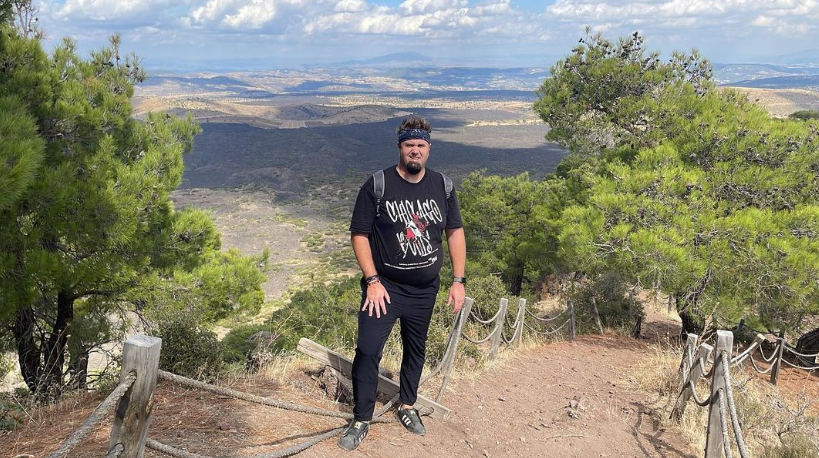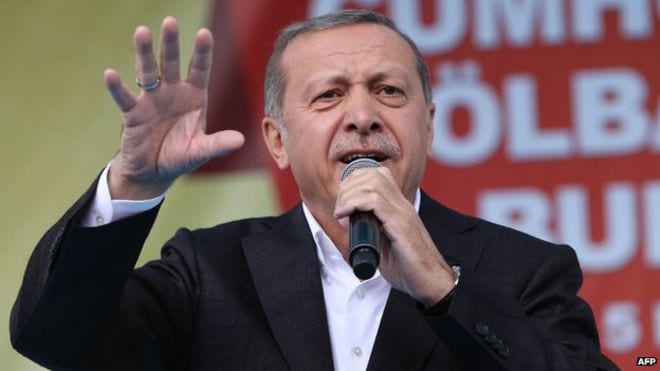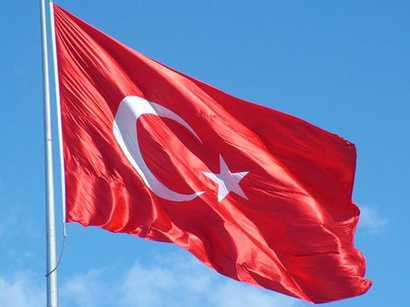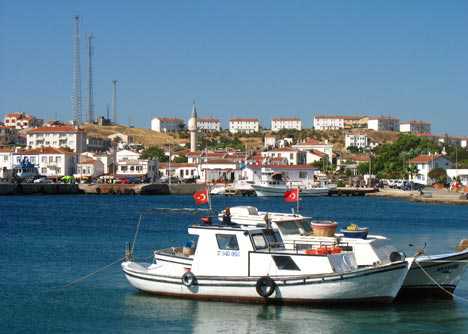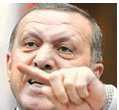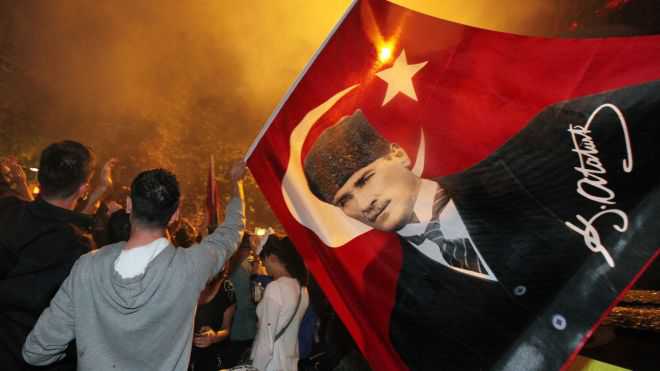
Nursema, 10, a daughter of Ali Haydar Bengi, who was among the nine Turks killed during an Israeli raid on a flotilla trying to run the Gaza blockade.
By DAN BILEFSKY and SEBNEM ARSU
Published: July 15, 2010
ISTANBUL — The Turkish charity that led the flotilla involved in a deadly Israeli raid has extensive connections with Turkey’s political elite, and the group’s efforts to challenge Israel’s blockade of Gaza received support at the top levels of the governing party, Turkish diplomats and government officials said.
Related

Tyler Hicks/The New York Times
An anti-Israel slogan in Istanbul reflects the rift in Israeli-Turkish relations after the raid. Turkey warns that relations could be irreparably damaged.
The charity, the Humanitarian Relief Foundation, often called I.H.H., has come under attack in Israel and the West for offering financial support to groups accused of terrorism. But in Turkey the group has helped Prime Minister Recep Tayyip Erdogan shore up support from conservative Muslims ahead of critical elections next year and improve Turkey’s standing and influence in the Arab world.
According to a senior Turkish official close to the government, who spoke on the condition of anonymity because of the political delicacy of the issue, as many as 10 Parliament members from Mr. Erdogan’s governing Justice and Development Party were considering boarding the Mavi Marmara, the ship where the deadly raid occurred, but were warned off at the last minute by senior Foreign Ministry officials concerned that their presence might escalate tensions too much.
When leaders of the charity returned home after nine Turks died in the Israeli raid, they were warmly embraced by top Turkish officials, said Huseyin Oruc, deputy director of the charity, who was aboard the flotilla.
“When we flew back to Turkey, I was afraid we would be in trouble for what happened, but the first thing we saw when the plane’s door opened in Istanbul was Bulent Arinc, the deputy prime minister, in tears,” he said in an interview. “We have good coordination with Mr. Erdogan,” he added. “But I am not sure he is happy with us now.”
The raid has caused a rupture between Turkey and Israel, and heightened alarm in the United States and Europe that Turkey, a large Muslim country and a major NATO member, is shifting allegiance toward the Arab world. Turkey has warned that its cooperative ties to Israel could be irreparably damaged unless the Israelis apologize and accept an international investigation, steps Israel has so far refused to take.
The charity’s mission, political analysts said, has advanced Mr. Erdogan’s aim of shifting Turkey’s focus to the Muslim east when its prospects for joining the European Union are dim.
The government “could have stopped the ship if it wanted to, but the mission to Gaza served both the I.H.H. and the government by making both heroes at home and in the Arab world,” said Ercan Citlioglu, a terrorism expert at Bahcesehir University in Istanbul.
Turkish officials said that the charity operated independently and that its leadership had refused to drop plans to break Israel’s naval blockade of Hamas-controlled Gaza, despite requests from the government. The officials said they had no legal authority to stop the work of a private charity.
Egemen Bagis, Turkey’s minister for European affairs, said in an interview that the charity and the Justice and Development Party, called the AK Party, had no substantive ties, even if people in politics often became involved in charitable groups. “The I.H.H. has nothing to do with the AK Party, and we have no hidden agenda,” Mr. Bagis said.
But critics say such statements belie the close connections between the party and the charity, as well as the extent to which Turkish officials were closely attuned to the details of the flotilla’s mission before its departure.
“How can such a large country as Turkey, with interests in four continents, and with an export- and investment-driven economy requiring extra caution all around the globe, be dragged to the brink of war by a nongovernmental organization?” asked Semih Idiz, a columnist for the Hurriyet Daily News in Turkey, in a June 7 editorial. The answer, he added, is that the charity is a “GNGO” — a “governmental-nongovernmental-organization.”
Many of the 21 people listed on the charity’s board have or had close links to the AK Party. In January, Murat Mercan, chairman of Parliament’s foreign affairs committee and a senior party official, joined an overland aid convoy to Gaza organized by the charity that tried to force its way through the Rafah crossing from Egypt to Gaza.
A trustee of the charity, Ali Yandir, is a senior manager at the Istanbul City Municipality Transportation Corporation. The corporation sold the Mavi Marmara, with a capacity for 1,090 passengers, to the charity for about $1.2 million. In 2004, Mr. Yandir was an AK Party candidate for the mayor’s office in Istanbul’s Esenler District.
The charity’s board includes Zeyid Aslan, an AK Party member of Parliament and the acting head of the Turkey-Palestine Interparliamentary Friendship Group; Ahmet Faruk Unsal, an AK Party member of Parliament from 2002 to 2007; and Mehmet Emin Sen, a former AK Party mayor in the central Anatolian township of Mihalgazi.
Those ties partly reflect the common agenda of the party and the charity. Both are involved in relief work among the poor and are bound by a common Islamic ideology. Many of the 60,000 people the charity claims as members come from the religious merchant class that helped Mr. Erdogan sweep to power.
The Humanitarian Relief Foundation was founded in the early 1990s, first as a charity for the poor in Istanbul, and later for Bosnian war victims. It works in more than 100 countries and sent 33 tons of aid to Haiti after its January earthquake. The charity has one branch in the West Bank and another in Gaza, where Turkish families help pay for the care and education of 9,000 orphans.
On Monday, Germany banned the charity’s offices there, citing its support for Hamas, which Germany considers a terrorist organization. Interior Minister Thomas de Maizière said the charity abused donors’ good intentions “to support a terrorist organization with money supposedly donated for charitable purposes.” The newspaper Süddeutsche Zeitung said that from 2007 the charity collected $8.5 million and transferred money to six smaller organizations, two belonging directly to Hamas and four with close ties to it.
The charity called the ban a “disgrace” and “misanthropic” and said it would challenge it in court.
A June 21 letter signed by 87 United States senators urged the White House to investigate whether the charity should be designated a foreign terrorist organization. Israel has accused the charity of bolstering Hamas. It also says the group has links to Al Qaeda and has bought weapons, accusations the charity denies.
A senior Turkish government official, speaking on the condition of anonymity, called such allegations false and said they would not persuade politicians who supported the group’s causes to shun it.
“We are not trying to disengage ourselves from I.H.H. because of the current allegations on their terror links — we are simply not related with them,” the official said. “We consider Israeli efforts to link I.H.H. with terror in light of fake intelligence reports and hence hold AK Party government responsible for the killing of nine innocent people as extremely cheap and improper tactics.”
This article has been revised to reflect the following correction:
Correction: July 23, 2010
An article last Friday about the connections between Turkey’s political elite and I.H.H., the Turkish charity that organized the Gaza-bound aid flotilla stopped by a deadly Israeli raid on May 31, contained several errors.
Because of an editing error, the article misstated the effect of a ban on I.H.H. in Germany, where a charity that operates under the same name and was founded by the same people became legally separate in 1997. The ban applied only to the German charity, not the Turkish one.
The article also misstated the price paid by the Turkish charity for the lead flotilla vessel, the Mavi Marmara. It was $1.2 million, not $1.8 million.
And the article referred incorrectly to the relationship between Istanbul Fast Ferries, the municipal agency that sold the Mavi Marmara to the Turkish charity, and the Istanbul City Municipality Transportation Corporation, another city agency. While both are controlled by Turkey’s ruling AK party, the transportation corporation is responsible for land transit; it does not oversee the ferry agency.
A version of this article appeared in print on July 16, 2010, on page A4 of the New York edition.

